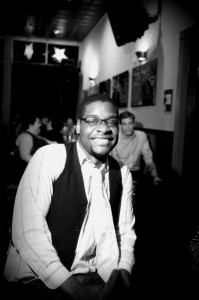CareerACCESS, a community-driven proposed program of reforms to SSI that will provide an alternative benefits program for youth with disabilities, has a new blog that features stories of youth with disabilities across the US and their experience with SSI.
One recent installment is called “Receiving SSI: Are You Safe? Or Suffocating?” by D’Arcee Neal. Check out D’Arcee’s story below, and read more stories and take action at: www.ourcareeraccess.org/index.php/blog.
Receiving SSI: Are You Safe? Or Suffocating?
By D’Arcee Neal
 As I write this blog, I’m sitting in my first office that I’ve been at for almost a year now. Thinking about the path that got me to this place is one that is reminiscent for almost all millennials these days, but I’d add that for those of us with disabilities, the hardship is only magnified by systemic inadequacies and limitless red tape.
As I write this blog, I’m sitting in my first office that I’ve been at for almost a year now. Thinking about the path that got me to this place is one that is reminiscent for almost all millennials these days, but I’d add that for those of us with disabilities, the hardship is only magnified by systemic inadequacies and limitless red tape.
Social security is for many, a needed relief to help mitigate circumstances where too little money would put you on the streets, starving. In places like North Carolina where I used to live, it provided me a comfortable moment to breathe after school when I had lost my job. But I have cerebral palsy. I don’t drive. And SSI was making me lazy, and complacent in a place where I knew I could do better. After my first internship with NASA in DC, in a city providing me with autonomous transportation anytime, anywhere, I knew I could never go back to living in a place where I called friends for a ride just to leave the house. After studying abroad in Germany, traveling in Europe and completing my Masters in London, I never had any intention of staying in North Carolina, but for those of us who want to branch out after school, current SSI rules make that all but impossible.
For the next two years and some change, I was unemployed and harder still, I lived in DC, on SSI. Being restricted on income is hard enough without a sufficient work history to support you. But when you’re trying to live and find work in the second most expensive city in America? You learn quickly about what my friends and I call “The Struggle.” I lived off a medium suitcase, and a twin bed in a shared room on the edge of the metro where my rent was 85% of my check, because if you wanted to be mobile in the city, you had no choice. I made $20.00 last two weeks for food and giving up 8 bucks for a Netflix account was my only luxury, because if not, I would’ve went crazy. But SSI was there, and I made it work until I worked enough temp jobs and internships to get myself hired to a corporate position. But without the money to save, I calculated trips, planned out resources and depleted myself of a social life completely. This works for some people, but I knew what I wanted out of my life and being tied to SSI was strangling me emotionally.
Part of successful transitioning to adulthood is the ability to make and take risks. To find a job, you have to risk putting your resume out there to be seen by potential employers. That includes going where jobs are and where managing your disability is easier through more transportation options or better healthcare benefits among others. But unlike able bodied Americans, the cycle for restrictive or discriminatory employment practices, coupled with social security’s vicegrip on financial statuses, require people with disabilities to remain tethered to an antiquated system that does more harm than good. The answer is simple. People with disabilities deserve good jobs, good pay, and good benefits, rewarded through employment. This is why the CareerACCESS initiative is so important. By restructuring the way people with disabilities access and engage employment, we can change the nature of the conversation. Finishing school and finding a job is hard enough. Having a disability shouldn’t make it more so.
Help us get closer to reforming SSI by signing our CareerACCESS petition here. You can also follow us on Twitter or Facebook!
D’Arcee Neal has worked in disability advocacy and policy for over seven years with a variety of clients in independent living centers, non-profit organizations and the federal government. Receiving his MA in Creative Professional Writing from Roehampton University in London, he is also a novelist and screenwriter utilizing disability, race and identity as themes. Currently, he works at United Cerebral Palsy National in Washington D.C. as the Manager of Institutional Giving, where he fundraises with corporations partnering with UCP and its affiliates.

